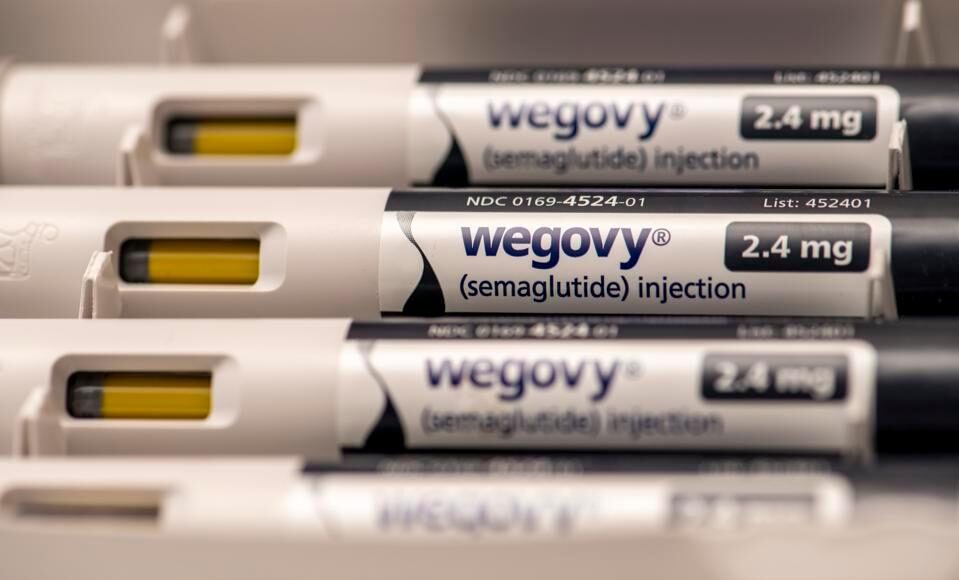Weight loss and diabetes drugs Wegovy and Ozempic are not linked to an increase in suicidal thoughts, according to research published in Nature Medicine Friday, an encouraging finding for consumers as health agencies in Europe and the U.S. probe the potential side effects of the wildly popular medicines.
Researchers said they found no evidence the drug semaglutide increased the risk of suicidal thoughts after reviewing millions of U.S. health records.
Semaglutide, which mimics the action of the GLP-1 hormone responsible for regulating appetite and blood sugar, is the active ingredient inside Novo Nordisk’s wildly popular drugs Wegovy and Ozempic, approved for treating obesity and type 2 diabetes, respectively.
The researchers identified nearly 1.6 million people receiving treatment for diabetes and more than 240,000 being treated for obesity from the anonymized health records of more than 100 million people across the U.S.
They analyzed how people taking semaglutide fared compared to those prescribed other drugs for the conditions over the first six months of treatment, with people using semaglutide actually having a lower risk of suicidal ideation.
When measured at six months, the risk of having first-time suicidal thoughts was 73% and 64% lower among those using Wegovy for weight loss and Ozempic for diabetes, respectively, compared those using other drugs including bupropion, naltrexone, orlistat for weight loss and insulin and metformin for diabetes.
For patients with a history of suicidal thoughts, Wegovy and Ozempic were linked to a lower risk—56% and 49%, respectively—of recurrent thoughts compared to people taking other drugs.
In July, the European Medicines Agency said it was investigating semaglutide and similar medicines following reports of possible self-injury and suicidal thoughts among those taking it. The agency has not reached a conclusion on whether the drugs were responsible for the incidents. The Food and Drug Administration is also investigating potential side effects for the drugs including hair loss and suicidal ideation, stressing it is looking into a potential issue and has not identified any concrete causal link.
Researchers examined patients for up to three years in this case and found lower risks of suicidal ideation among semaglutide users through that time. As the study was observational, it can only look at trends and cannot determine whether a relationship is causal. Nora Volkow, who was involved with the study and is director of the National Institute on Drug Abuse, told the New York Times “more studies are absolutely needed” to investigate any cause and effect involved. As the medicine is relatively new, longer term research examining potential side effects will also be needed.
People taking Ozempic (off label) and Wegovy for weight loss have reported stopping other habits as well, such as smoking, drinking, shopping and nail biting. While anecdotal, the reports have encouraged scientists investigating semaglutide as a potential means of curbing addiction in lab animals. Should research pan out, it could offer clinicians a powerful new tool to help treat addiction and compulsive behaviors. Rong Xu, director of the Center for Artificial Intelligence in Drug Discovery at Case Western Reserve University who was also involved in the study, told the Times the group also examined the same large database to investigate whether Wegovy could potentially curb cravings for cigarettes and alcohol. While cautioning that the study is still undergoing review, Xu said the data supports anecdotal reports of fewer cravings.
The arrival of effective anti-obesity drugs has been heralded as a major milestone in medicine that could help tackle one of today’s most pressing public health problems. Semaglutide has proven enormously popular and sales rapidly propelled maker Novo Nordisk into the position of Europe’s most valuable company. Analysts believe weight loss drugs—and other similar ones joining it on the market such as Eli Lilly’s Zepbound—could become one of the most lucrative sectors in the history of the pharmaceutical industry. Novo has admitted it cannot keep pace with booming demand and is unlikely to be able to do so for years to come and concern is rising over fakes on the market. Potential rare side effects, which cannot be monitored effectively in clinical trials due to their low incidence, are also of concern given the high numbers taking the medicine.
If you or someone you know is in crisis and needs mental health resources and support, call or text the Suicide & Crisis Lifeline at 988 or visit 988lifeline.org for free and confidential support 24/7.
FDA looking into reports of hair loss, suicidal thoughts in people using popular drugs for diabetes and weight loss (CNN)
Nestlé Is Developing Products To Accompany Drugs Like Ozempic— Amid Fears They’ll Eat Into Food Sales (Forbes)








